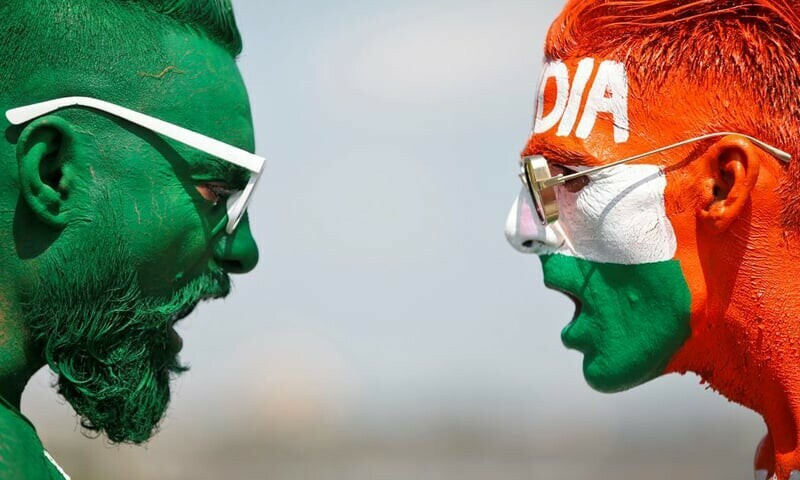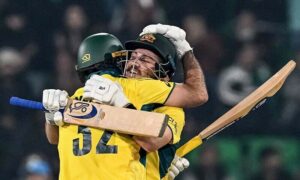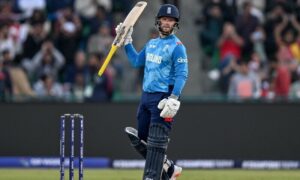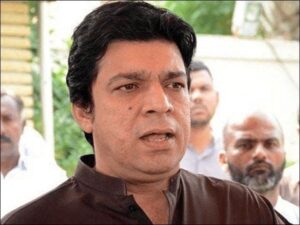With so much history between these two cricketing giants, we can only hope this match lives up to its legacy and becomes another classic to remember.
The latest Netflix series, The Greatest Rivalry: India vs Pakistan, just dropped — and like a last-over thriller, fans devoured it within hours. No cricketing feud burns hotter than this, and the series plunges deep into the heart of the high-octane clashes that have defined generations.
With all the drama, passion, and political undercurrents, the three-part documentary relives the fierce battles of the 1999-2004 era — an unforgettable chapter in this storied rivalry.
But make no mistake — this war didn’t start in 1999. If we rewind 15 years before and after Pakistan’s historic 1999 tour of India, we uncover epic showdowns across the globe, none more iconic than those in Sharjah.
Matches between Pakistan and India have always been nail-biting battles, with sky-high stakes, and intensity unmatched. In these encounters, it’s either glory or heartbreak — nothing in between. Here, we revisit some of the closest encounters, where either team could have won and scripted history.
Let victory slip from their grasp
One of Pakistan’s most shocking defeats at the hands of India came in March 1985 at Sharjah. India, the reigning World Champions, and Pakistan faced off once again in the opener of the Rothmans Cup, a four-nation tournament, featuring Australia and England as well.
Led by Javed Miandad, Pakistan bundled out India for just 125, with Imran Khan, returning after recovering from injury, taking 6 wickets for 14 runs. In the second innings, however, Pakistan’s batting lineup crumbled under pressure, with five players failing to score and key batters getting caught by Sunil Gavaskar. In the end, Pakistan were bowled out for just 87 in 32.5 overs when they could have won.
1986 — The year Pakistan took control
Two matches, played in the same year, at the same ground, and each delivering nail-biting encounters. A coincidence, perhaps, but also a testament to the drama that unfolded on that field. The first showdown between Pakistan and India took place on April 18 — a battle between the reigning world champions and the to-be world-champions. In the final of the first Austral-Asia Cup, India dominated early on, but everything changed when Javed Miandad stepped onto the field.
India scored 245, thanks to an explosive 117 by Kris Srikkanth and 75 by Sunil Gavaskar. Luck wasn’t favouring Pakistan, and their chase of 246 quickly turned into a struggle at 110/4. Miandad, who hadn’t batted in the previous two matches of the tournament, found himself walking in as early as the 12th over, carrying the hopes of an entire nation.
With over 40 required in the last four overs, Javed rotated the strike perfectly with the tail-enders. He did score a masterclass hundred, but it was a rollercoaster ride. Who could forget the final ball from Chetan Sharma when four runs were required, and India, on the verge of victory, lost the match to that legendary six?
The only other clash between the two teams that year took place in Sharjah in December. While chasing a modest target of 146 in a league match, Pakistan lost Miandad and Imran Khan for ducks.
The ghosts of the Rothmans Cup defeat began to resurface, casting a sense of déjà vu over the game. Maninder Singh removed four batters, while Ravi Shastri took the other two wickets. At this point, all-rounder Manzoor Elahi, who had scored nine in that ill-fated match and just four in the Austral-Asia Cup final, entered when the score was 65/6. Shastri was greeted with a six as Manzoor scored a 54-ball 50. He hit two sixes and three fours in his innings and ensured Pakistan dominated the One-Day International series (ODI) scene for years to come.
Malik’s heroics
Salim Malik, the man who also failed to shine in the 1985 ‘nightmarish’ fixture and the Austral-Asia Cup final a year later, was the one to take the World Champions to the cleaners on that fateful day — February 18, 1987, in Calcutta (now Kolkata).
In a 40-over match, a target of 240 was achievable, but with ‘slogging’ only associated with lower-order batters, it was a bit difficult. When Salim Malik entered at 160/5, Pakistan required 79 runs in eight overs to win. Without headgear, he smashed a boundary off the second ball of left-arm spinner Maninder Singh. He scored another 19 runs in Singh’s next over and 16 off the following, the 36th, bowled by Kapil Dev. Malik completed his 50 off 23 deliveries and hit the winning runs with two wickets in hand, eventually scoring 72 off 36.
Nine years later, he again helped his side win — this time hundreds of miles away in Toronto, at the Sahara Cup’s inaugural match. This time, he was patient, scoring an unbeaten 70 off 81. Needing 265 in 50 overs, Malik came in at 115/3 after the fall of Inzamam-ul-Haq. Saeed Anwar left him after scoring 80, with the team score at 144. Moin Khan and Wasim Akram chipped in with scores of 14 and 20, respectively, but Malik was all set to repeat his heroics from nine and a half years earlier.
With 50-odd runs required in the last 10 overs, he batted sensibly and meted out the same treatment to Javagal Srinath, Anil Kumble, and Sunil Joshi as he had to Kapil Dev and Maninder Singh years earlier. Pakistan won the match by two wickets, with one delivery to spare.
Losing again
After losing 1-4 to India in the next edition of the Sahara Cup, the Men in Blue visited Pakistan for a three-match series. In the second match in Karachi, India emerged victorious, capitalising on Wasim Akram’s absence. Chasing a target of 266 in 47 overs, they lost their top batters before even reaching 200. India needed to score the runs within 47 overs, with the tone set by an innings of 89 from Sourav Ganguly.
A crucial 62-run partnership between all-rounder Robin Singh and wicketkeeper Saba Karim brought India closer to victory. In the tense final moments, the ‘lost’ ball was changed, and Saqlain Mushtaq struggled to control the new one. It was Rajesh Chauhan — Saqlain’s counterpart — who sealed the match dramatically, smashing him for a six in the final over.
And it continued
Four months later, Pakistan and India faced off again in the Independence Cup final in Dhaka. With both teams having won one final each, the third match became the ultimate decider. If playing in a country born from its own conflict wasn’t ironic enough, a thrilling contest in fading light and a record-breaking chase made it truly iconic. A partnership of 230 runs between centurions Saeed Anwar and Ijaz Ahmed nearly took the match away from India. However, Sourav Ganguly’s hundred exposed Pakistan’s weak bowling attack, and a 179-run stand with Robin Singh — the one who had been at the other end in Karachi — sealed the match.
With eight runs needed in the final over, everything that could go wrong did. Javagal Srinath’s mishit landed safely between three fielders, and Hrishikesh Kanitkar struck Saqlain Mushtaq for a four on the penultimate ball to clinch the title. Having faced heartbreak with the ball twice, Saqlain ensured that the next time a crunch moment arrived, he wouldn’t let the nation down. Two years later, he had his chance — and this time, he wasn’t bowling.
Plunder, down under
In the tri-series in Australia, Pakistan faced India. It was January 2000, and in Brisbane, Ganguly and Robin Singh (again) scored fifties to take India to 195. With over 16 overs to go, Pakistan were 120/7. Saeed Anwar and Wasim made 24 each, while the then Yousuf Youhana (who later changed his name to Mohammad Yousuf) got out for 63 when the team still needed 43 in around seven overs. With just two wickets in hand, Saqlain took control, batting with the composure of a senior alongside Waqar Younis. As the tension peaked, with one run needed off the final ball, Venkatesh Prasad attempted a Mankad dismissal on Waqar, only to be left deeply frustrated.
Ironically, Prasad was the same bowler who had tormented Pakistan in the 1996 Bangalore quarter-final and again in the Super Six clash three years later in Manchester. Waqar had been thrashed in the 1996 quarter-final and also had a point to prove. Saqlain’s 27 off 52 deliveries and Waqar’s 13 off 15 helped Pakistan win on the last ball of the match.
Three years and four months later, in Karachi, India once again emerged victorious in a familiar scenario. Six runs were required off the final delivery for a win, and the man known for effortlessly hitting sixes, Moin Khan, was at the crease. Facing left-arm pacer Ashish Nehra, the former captain was undone by a brilliant delivery and dismissed. Despite chasing an unprecedented target of 350 runs, Pakistan fell short by a slim margin, managing 344 runs in their 50 overs.
In 2014, the two sides would meet again in Mirpur, a neighbourhood in Dhaka, the capital of Bangladesh, for the final of the Asia Cup. The target given to Pakistan was identical to the first Austral-Asia Cup final, and the result was similar.
The final over began with Pakistan losing off-spinner Saeed Ajmal, bowled by his Indian counterpart Ravichandran Ashwin. The sight of a young boy cheering for India captured the immense pressure Pakistan and Shahid Afridi were under. When the last man, Junaid Khan, scampered for a single on the second ball of the last over, the match was still wide open.
With nine needed off four deliveries, what would Shahid Afridi do? He did what he does best — sending the ball soaring for two massive sixes, not even waiting for the last two balls. Pakistan triumphed with two deliveries to spare, and in the last decade, few victories have matched the sheer drama and audacity of this one.
Heartbreak in T20 World Cups
One of the closest encounters between the two arch-rivals in T20 history took place in Johannesburg in September 2007 — the final of the inaugural T20 World Cup. Having already played a tied match in the tournament against India (lost in the super over), expectations were high for a legendary face off.
Batting first, India posted 158, thanks to a crucial cameo from a young Rohit Sharma, who scored 30 off 16 balls in his debut series. Chasing 158, Pakistan crumbled early, losing Kamran Akmal and Shahid Afridi for ducks. At 104/7, their hopes faded further when Yasir Arafat departed.
Yet, Misbah-ul-Haq, with four sixes and no fours, fought back with a gutsy 43, bringing Pakistan within touching distance of victory. With just six runs needed off four balls, he attempted a scoop shot over short fine leg but mistimed it, handing a simple catch to the fielder. Pakistan lost the final by five runs, and though Misbah later led them to an ODI series win in India five years later, many still blamed him for the heartbreak.
Fast forward to the ICC Men’s T20 World Cup 2024, held in the USA. The Indo-Pak clash took place in New York — the same city where, 180 years earlier, the first-ever bilateral match of any sport was played. This time, Rohit Sharma, once a rookie in 2007, led India to another improbable victory. Pakistan, needing just a run-a-ball, faltered spectacularly. Poor selection, lacklustre captaincy, and sheer bad luck saw them lose a match that was theirs to win. Managing only 113 runs in their allotted overs, Pakistan failed to progress to the next stage, adding yet another painful chapter to their World Cup struggles against India.
As Pakistan and India prepare to face off again on February 23 in Dubai, the stakes couldn’t be higher. Pakistan enters as the defending champion, while India has proven they can bring the champions out of their den. With so much history between these two cricketing giants, we can only hope this match lives up to its legacy and becomes another classic to remember.
Header image: Cricket fans, with their faces painted in the Indian and Pakistani national flag colours, pose for a picture ahead of the first match between India and Pakistan in Twenty20 World Cup super 12 stage in Dubai, in Ahmedabad, India. — Reuters
- Desk Reporthttps://foresightmags.com/author/admin/











